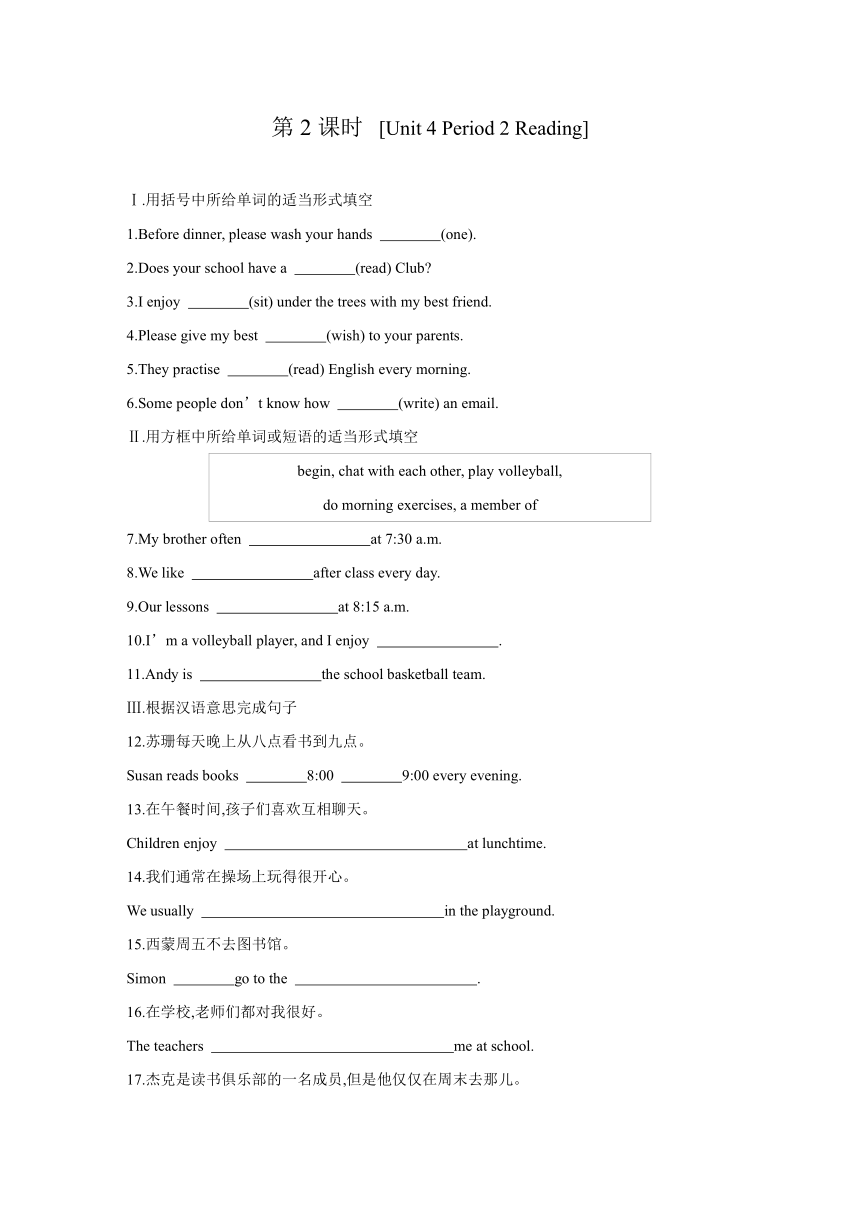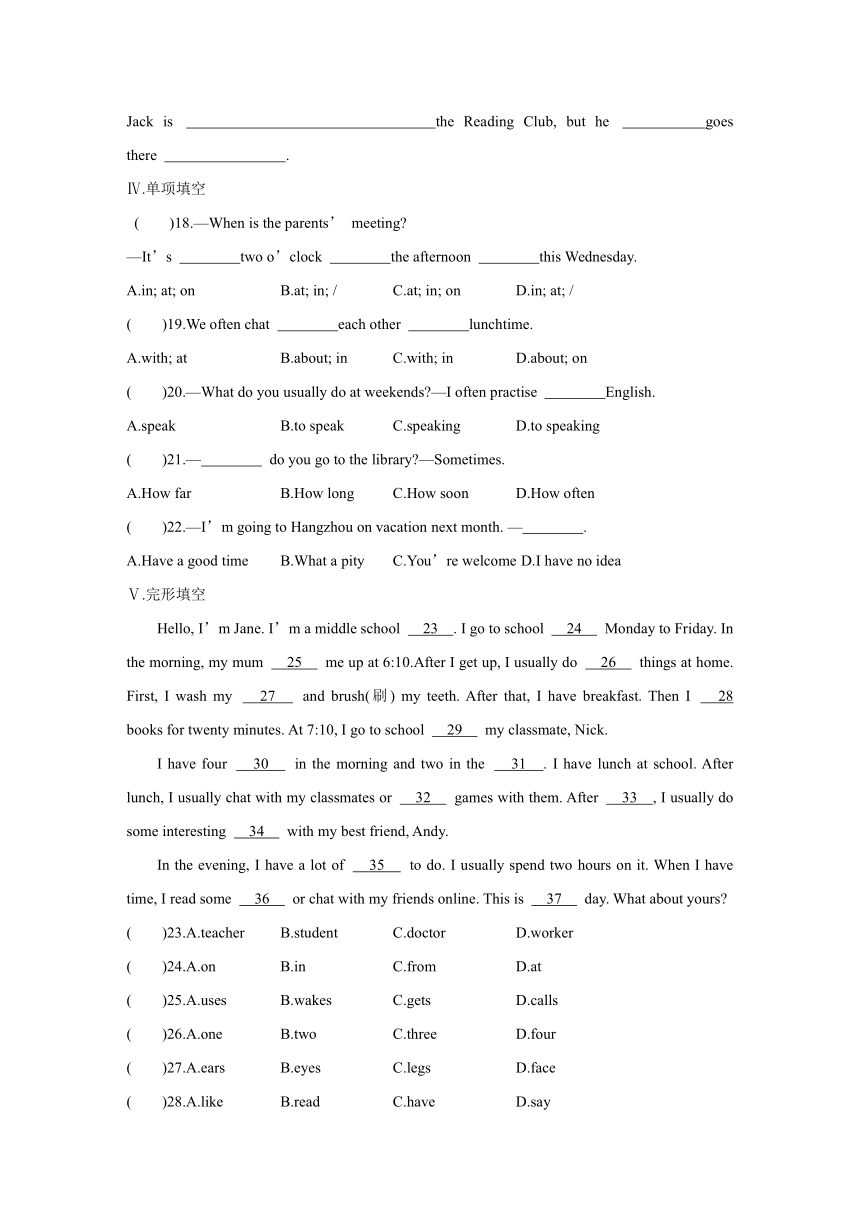Unit 4 My day Period 2 Reading 课时练习(含答案)
文档属性
| 名称 | Unit 4 My day Period 2 Reading 课时练习(含答案) |  | |
| 格式 | docx | ||
| 文件大小 | 53.0KB | ||
| 资源类型 | 教案 | ||
| 版本资源 | 牛津译林版 | ||
| 科目 | 英语 | ||
| 更新时间 | 2022-05-15 06:28:30 | ||
图片预览



文档简介
第2课时 [Unit 4 Period 2 Reading]
Ⅰ.用括号中所给单词的适当形式填空
1.Before dinner, please wash your hands (one).
2.Does your school have a (read) Club
3.I enjoy (sit) under the trees with my best friend.
4.Please give my best (wish) to your parents.
5.They practise (read) English every morning.
6.Some people don’t know how (write) an email.
Ⅱ.用方框中所给单词或短语的适当形式填空
begin, chat with each other, play volleyball, do morning exercises, a member of
7.My brother often at 7:30 a.m.
8.We like after class every day.
9.Our lessons at 8:15 a.m.
10.I’m a volleyball player, and I enjoy .
11.Andy is the school basketball team.
Ⅲ.根据汉语意思完成句子
12.苏珊每天晚上从八点看书到九点。
Susan reads books 8:00 9:00 every evening.
13.在午餐时间,孩子们喜欢互相聊天。
Children enjoy at lunchtime.
14.我们通常在操场上玩得很开心。
We usually in the playground.
15.西蒙周五不去图书馆。
Simon go to the .
16.在学校,老师们都对我很好。
The teachers me at school.
17.杰克是读书俱乐部的一名成员,但是他仅仅在周末去那儿。
Jack is the Reading Club, but he goes there .
Ⅳ.单项填空
( )18.—When is the parents’ meeting
—It’s two o’clock the afternoon this Wednesday.
A.in; at; on B.at; in; / C.at; in; on D.in; at; /
( )19.We often chat each other lunchtime.
A.with; at B.about; in C.with; in D.about; on
( )20.—What do you usually do at weekends —I often practise English.
A.speak B.to speak C.speaking D.to speaking
( )21.— do you go to the library —Sometimes.
A.How far B.How long C.How soon D.How often
( )22.—I’m going to Hangzhou on vacation next month. — .
A.Have a good time B.What a pity C.You’re welcome D.I have no idea
Ⅴ.完形填空
Hello, I’m Jane. I’m a middle school 23 . I go to school 24 Monday to Friday. In the morning, my mum 25 me up at 6:10.After I get up, I usually do 26 things at home. First, I wash my 27 and brush(刷) my teeth. After that, I have breakfast. Then I 28 books for twenty minutes. At 7:10, I go to school 29 my classmate, Nick.
I have four 30 in the morning and two in the 31 . I have lunch at school. After lunch, I usually chat with my classmates or 32 games with them. After 33 , I usually do some interesting 34 with my best friend, Andy.
In the evening, I have a lot of 35 to do. I usually spend two hours on it. When I have time, I read some 36 or chat with my friends online. This is 37 day. What about yours
( )23.A.teacher B.student C.doctor D.worker
( )24.A.on B.in C.from D.at
( )25.A.uses B.wakes C.gets D.calls
( )26.A.one B.two C.three D.four
( )27.A.ears B.eyes C.legs D.face
( )28.A.like B.read C.have D.say
( )29.A.behind B.for C.to D.with
( )30.A.lessons B.subjects C.classmates D.teachers
( )31.A.classroom B.morning C.afternoon D.evening
( )32.A.look B.study C.play D.start
( )33.A.everything B.school C.work D.home
( )34.A.classes B.lessons C.dances D.activities
( )35.A.housework B.homework C.exercise D.lessons
( )36.A.newspapers B.TV C.games D.talks
( )37.A.your B.her C.his D.my
Ⅵ.阅读理解
Zhixing is eleven years old. He is in Grade Five. He spends most of his free time in front of his computer on weekends. But Zhixing is not playing games or surfing the Internet. The boy is interested in basic(基本的) computer coding(编程). “I signed him up(报名) for coding lessons about one and a half years ago. I think it may be an important skill. He wants to learn it. I’m happy that he’s enjoying it,” says Zhixing’s mother.
Tao Mingshun’s 13-year-old son learns coding, too. The boy and his classmates find the games and other activities(活动) in the weekend classes “a bit difficult but fun”. Many students are excited to learn coding now. I think there will be more students learning it one day.
( )38.Zhixing uses the computer to .
A.play games
B.surf the Internet
C.talk with his friends
D.learn computer coding
( )39.Zhixing has had coding lessons for about .
A.one and a half years B.six weeks
C.sixty days D.six years
( )40.What does Tao Mingshun’s son think of computer coding
A.Very easy but boring(无聊的). B.A bit hard but interesting.
C.Easy and interesting. D.A bit difficult and boring.
( )41.What does the underlined word “excited” mean in Chinese
A.厌烦的 B.生气的
C.兴奋的 D.惊讶的
( )42.What’s the best title of the passage
A.A New Game for Students—Coding B.An Interesting Activity on Weekends
C.What People Use the Computer for D.Some Hard-working Boys
答案
Ⅰ.1.first 2.Reading
3.sitting 4.wishes
5.reading 6.to write
Ⅱ.7.does morning exercises
8.chatting/to chat with each other
9.begin 10.playing volleyball
11.a member of
Ⅲ.12.from; to
13.chatting with each other
14.have a good/great time
15.doesn’t; library on Friday
16.are all nice to
17.a member of; only; on weekends
Ⅳ.18.B 介词的用法。表示在具体某一时刻用at; 表示在上午、下午或晚上用in; 在星期几(上午、下午或晚上)用on。 但是当星期几前面有this, next, last, every或each等词修饰时,其前不加介词。句意:“家长会是什么时候 ”“本周三下午两点。”故选B。
19.A chat with sb意为“与某人聊天”;at lunchtime意为“在午饭时间”,故选A。
20.C practise doing sth意为“练习做某事”。故选C。
21.D 疑问短语辨析。how far意为“多远”;how long意为“多长;多久”;how soon意为“多久以后”;how often意为“多久一次(对频率进行提问)”;根据答语“有时候”可知是对频率提问,故选D。
22.A 情景交际。have a good time意为“玩得愉快”;what a pity意为“真遗憾”;you’re welcome意为“不用谢”;I have no idea意为“我不知道”。句意:“下个月我将去杭州度假。”“祝你玩得愉快。”故选A。
Ⅴ.23—27 BCBCD 28—32 BDACC
33—37 BDBAD
Ⅵ.【主旨大意】 本文介绍了越来越多学生在网上学习编程。
38.D 细节理解题。由第一段中“But Zhixing is not playing games or surfing the Internet. The boy is interested in basic computer coding.”可知,志兴用电脑学编程。
39.A 细节理解题。由第一段中“I signed him up for coding lessons about one and a half years ago.”可知,志兴学编程一年半了。
40.B 细节理解题。由第二段中“The boy and his classmates find the games and other activities in the weekend classes ‘a bit difficult but fun’.”可知,陶明顺的儿子认为编程“有点难但是有趣”。
41.C 词义猜测题。上文提到了孩子们认为编程“难而有趣”, 下文提到有更多的孩子会学习编程, 由此可推断出孩子们对学习编程是“兴奋的”。
42.A 主旨大意题。本文主要介绍了孩子们在网上学习编程。
Ⅰ.用括号中所给单词的适当形式填空
1.Before dinner, please wash your hands (one).
2.Does your school have a (read) Club
3.I enjoy (sit) under the trees with my best friend.
4.Please give my best (wish) to your parents.
5.They practise (read) English every morning.
6.Some people don’t know how (write) an email.
Ⅱ.用方框中所给单词或短语的适当形式填空
begin, chat with each other, play volleyball, do morning exercises, a member of
7.My brother often at 7:30 a.m.
8.We like after class every day.
9.Our lessons at 8:15 a.m.
10.I’m a volleyball player, and I enjoy .
11.Andy is the school basketball team.
Ⅲ.根据汉语意思完成句子
12.苏珊每天晚上从八点看书到九点。
Susan reads books 8:00 9:00 every evening.
13.在午餐时间,孩子们喜欢互相聊天。
Children enjoy at lunchtime.
14.我们通常在操场上玩得很开心。
We usually in the playground.
15.西蒙周五不去图书馆。
Simon go to the .
16.在学校,老师们都对我很好。
The teachers me at school.
17.杰克是读书俱乐部的一名成员,但是他仅仅在周末去那儿。
Jack is the Reading Club, but he goes there .
Ⅳ.单项填空
( )18.—When is the parents’ meeting
—It’s two o’clock the afternoon this Wednesday.
A.in; at; on B.at; in; / C.at; in; on D.in; at; /
( )19.We often chat each other lunchtime.
A.with; at B.about; in C.with; in D.about; on
( )20.—What do you usually do at weekends —I often practise English.
A.speak B.to speak C.speaking D.to speaking
( )21.— do you go to the library —Sometimes.
A.How far B.How long C.How soon D.How often
( )22.—I’m going to Hangzhou on vacation next month. — .
A.Have a good time B.What a pity C.You’re welcome D.I have no idea
Ⅴ.完形填空
Hello, I’m Jane. I’m a middle school 23 . I go to school 24 Monday to Friday. In the morning, my mum 25 me up at 6:10.After I get up, I usually do 26 things at home. First, I wash my 27 and brush(刷) my teeth. After that, I have breakfast. Then I 28 books for twenty minutes. At 7:10, I go to school 29 my classmate, Nick.
I have four 30 in the morning and two in the 31 . I have lunch at school. After lunch, I usually chat with my classmates or 32 games with them. After 33 , I usually do some interesting 34 with my best friend, Andy.
In the evening, I have a lot of 35 to do. I usually spend two hours on it. When I have time, I read some 36 or chat with my friends online. This is 37 day. What about yours
( )23.A.teacher B.student C.doctor D.worker
( )24.A.on B.in C.from D.at
( )25.A.uses B.wakes C.gets D.calls
( )26.A.one B.two C.three D.four
( )27.A.ears B.eyes C.legs D.face
( )28.A.like B.read C.have D.say
( )29.A.behind B.for C.to D.with
( )30.A.lessons B.subjects C.classmates D.teachers
( )31.A.classroom B.morning C.afternoon D.evening
( )32.A.look B.study C.play D.start
( )33.A.everything B.school C.work D.home
( )34.A.classes B.lessons C.dances D.activities
( )35.A.housework B.homework C.exercise D.lessons
( )36.A.newspapers B.TV C.games D.talks
( )37.A.your B.her C.his D.my
Ⅵ.阅读理解
Zhixing is eleven years old. He is in Grade Five. He spends most of his free time in front of his computer on weekends. But Zhixing is not playing games or surfing the Internet. The boy is interested in basic(基本的) computer coding(编程). “I signed him up(报名) for coding lessons about one and a half years ago. I think it may be an important skill. He wants to learn it. I’m happy that he’s enjoying it,” says Zhixing’s mother.
Tao Mingshun’s 13-year-old son learns coding, too. The boy and his classmates find the games and other activities(活动) in the weekend classes “a bit difficult but fun”. Many students are excited to learn coding now. I think there will be more students learning it one day.
( )38.Zhixing uses the computer to .
A.play games
B.surf the Internet
C.talk with his friends
D.learn computer coding
( )39.Zhixing has had coding lessons for about .
A.one and a half years B.six weeks
C.sixty days D.six years
( )40.What does Tao Mingshun’s son think of computer coding
A.Very easy but boring(无聊的). B.A bit hard but interesting.
C.Easy and interesting. D.A bit difficult and boring.
( )41.What does the underlined word “excited” mean in Chinese
A.厌烦的 B.生气的
C.兴奋的 D.惊讶的
( )42.What’s the best title of the passage
A.A New Game for Students—Coding B.An Interesting Activity on Weekends
C.What People Use the Computer for D.Some Hard-working Boys
答案
Ⅰ.1.first 2.Reading
3.sitting 4.wishes
5.reading 6.to write
Ⅱ.7.does morning exercises
8.chatting/to chat with each other
9.begin 10.playing volleyball
11.a member of
Ⅲ.12.from; to
13.chatting with each other
14.have a good/great time
15.doesn’t; library on Friday
16.are all nice to
17.a member of; only; on weekends
Ⅳ.18.B 介词的用法。表示在具体某一时刻用at; 表示在上午、下午或晚上用in; 在星期几(上午、下午或晚上)用on。 但是当星期几前面有this, next, last, every或each等词修饰时,其前不加介词。句意:“家长会是什么时候 ”“本周三下午两点。”故选B。
19.A chat with sb意为“与某人聊天”;at lunchtime意为“在午饭时间”,故选A。
20.C practise doing sth意为“练习做某事”。故选C。
21.D 疑问短语辨析。how far意为“多远”;how long意为“多长;多久”;how soon意为“多久以后”;how often意为“多久一次(对频率进行提问)”;根据答语“有时候”可知是对频率提问,故选D。
22.A 情景交际。have a good time意为“玩得愉快”;what a pity意为“真遗憾”;you’re welcome意为“不用谢”;I have no idea意为“我不知道”。句意:“下个月我将去杭州度假。”“祝你玩得愉快。”故选A。
Ⅴ.23—27 BCBCD 28—32 BDACC
33—37 BDBAD
Ⅵ.【主旨大意】 本文介绍了越来越多学生在网上学习编程。
38.D 细节理解题。由第一段中“But Zhixing is not playing games or surfing the Internet. The boy is interested in basic computer coding.”可知,志兴用电脑学编程。
39.A 细节理解题。由第一段中“I signed him up for coding lessons about one and a half years ago.”可知,志兴学编程一年半了。
40.B 细节理解题。由第二段中“The boy and his classmates find the games and other activities in the weekend classes ‘a bit difficult but fun’.”可知,陶明顺的儿子认为编程“有点难但是有趣”。
41.C 词义猜测题。上文提到了孩子们认为编程“难而有趣”, 下文提到有更多的孩子会学习编程, 由此可推断出孩子们对学习编程是“兴奋的”。
42.A 主旨大意题。本文主要介绍了孩子们在网上学习编程。
同课章节目录
- 预备课程
- Lesson 1 Nice to meet you !
- Lesson 2 A happy family
- Lesson 3 A nice school
- Lesson 4 You look cool !
- Lesson 5 Wonderful things
- Lesson 6 Have nice food
- Lesson 7 Enjoy our days
- Lesson 8 Let's have fun !
- Unit 1 This is me
- Unit 2 Let's play sports
- Unit 3 Welcome to our school
- Unit 4 My day
- Unit 5 Let’s celebrate
- Unit 6 Food and lifestyle
- Unit 7 Shopping
- Unit 8 Fashion
